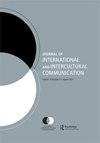重新审视跨文化适应:体现的方法
IF 2.2
Q2 COMMUNICATION
Journal of International and Intercultural Communication
Pub Date : 2022-09-26
DOI:10.1080/17513057.2022.2120207
引用次数: 0
摘要
本文章由计算机程序翻译,如有差异,请以英文原文为准。
Revisiting cross-cultural adaptation: An embodied approach
ABSTRACT This article provides an embodied approach to theorizing cross-cultural adaptation. I argue that a more diverse and holistic view of adaptation pays attention to the body as an experiencing subject in adaptation contexts. Engaging body geopolitics as guiding a concept, embodied approach to adaptation is a processual experiential approach in which the body engages intersubjective interactions that shapes a newcomer’s adaptation experiences. Using the autoethnographic analytic method, I examined my adaptation experiences as an African postcolonial migrant in the United States. I categorized these experiences into three interconnected situations: the felt geographies of my body, the corporeal experience of adaptation, and disidentification and geopolitics of my body. I theorized that adaptation is non-linear, and its complexity can be understood when the body is studied as the adapting subject.
求助全文
通过发布文献求助,成功后即可免费获取论文全文。
去求助
来源期刊

Journal of International and Intercultural Communication
COMMUNICATION-
CiteScore
3.80
自引率
12.50%
发文量
19
 求助内容:
求助内容: 应助结果提醒方式:
应助结果提醒方式:


